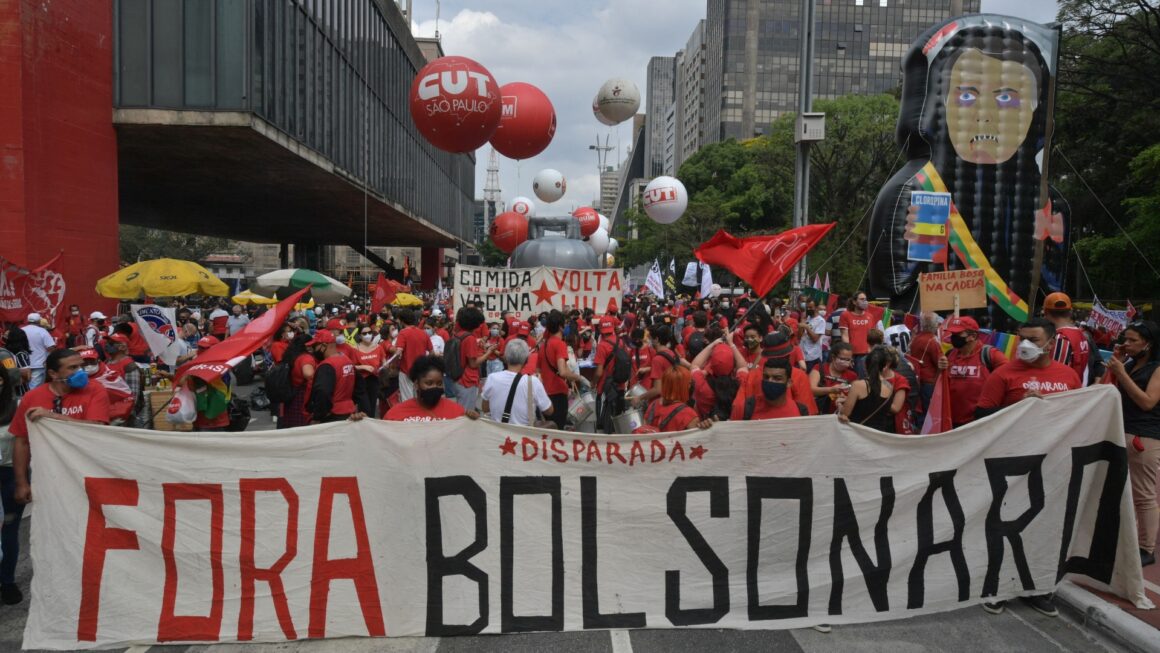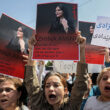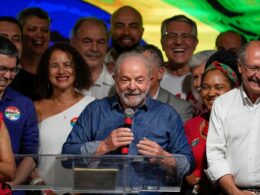By LSR (our sister organisation in Brazil)
The majority of Brazilians rejected Bolsonaro in the first round of the presidential election. Bolsonaro trailed Lula of the Workers Party (PT) by a difference of 6.18 million votes.
Despite this, the genocidal president has shown once again that he is not a lame duck. He remains a threat in the second round and will continue to be a destabilising and risky factor even if he loses the election.
Fighting Bolsonaro at the ballot box and in the streets remains the central task. At this moment, this necessarily includes a call to vote for Lula, despite all the differences we have with his policy of class collaboration and alliances with sectors of the right.
It is essential that all of us, the workers and the oppressed people, the social movements and the left, move into action now, but armed with the correct policies and learning the lessons from the mistakes made in this first round.
Bolsonaro can be defeated
In the final stretch of the campaign, Bolsonaro managed to broaden his traditional social base and get more votes than many expected. He surpassed his core base of support, which was around 30%, to reach 43.2% in the first round, against Lula’s 48.4%.
He achieved this by regaining some of the voters he had lost since 2018, mainly due to his criminal handling of the pandemic, the economic crisis and the corruption cases surrounding the government and the president’s family.
Among these former Bolsonaro voters are many who had been mobilised by anti-corruption rhetoric against the PT and were deluded by “Operation Lava Jato” (Operation Car Wash).
With the intensification of the polarisation between Bolsonaro and Lula and the fierce anti-PT offensive in the last period, combining anti-corruption rhetoric with anti-left ideological terrorism, part of these sectors returned to Bolsonaro against Lula.
This also influenced part of the potential voters of Ciro Gomes of the Democratic Labour Party (PDT) and Simone Tebet of the Brazilian Democratic Movement (MDB), as well as part of the undecided, who also chose to vote against Lula in the first round.
Bolsonaro did not manage to reverse his huge rejection among the poorest layers of the population despite his electioneering measures around Auxílio Brasil (national family allowance) etc. Still, if we put this together with the systematic campaign of far-right evangelical pastors and his clientelism, which is fuelled by the so-called “secret budget” in congress, we see that he has achieved some growth amongst these sectors.
None of this should be a surprise or cause for discouragement in the ranks of the working class. Despite the impact of his use of the government machine in the elections, Bolsonaro is the first sitting president who failed to come in first place in the first round of voting. Polls show that rejection of his government remains consistently high and his potential for growth is limited.
It is perfectly possible to defeat Bolsonaro in the second round and we are confident of doing so. However, it is essential that our campaign against Bolsonaro learns from the mistakes made so far and does not underestimate the enemy.
Mistakes in Lula’s campaign
It needs to be said explicitly. It was a mistake by Lula’s campaign and other sectors of the left to place absolute emphasis on the need for a victory in the first round and not prepare activists for a scenario (which was not at all unlikely) of a hard second round battle.
By adopting a triumphalist tone about the possibility of victory in the first round (something that has not happened since 1998 in a presidential election), they underestimated the weight of Bolsonarism and especially of anti-PTism.
Even more serious was the panic, demoralisation and disorientation provoked by saying that if the election were to go to a second round the risks would be much greater.
In addition to this, there are the structural contradictions of the Lula/Alckmin (Lula’s running mate) candidacy. Lula’s candidacy was built on a broad alliance, including sectors of the bourgeoisie and the so-called ‘democratic’ right wing. This resulted in a vague programme that does not commit itself to structural changes and seeks to convince the business community that they have nothing to fear.
This also led to a campaign that did not rely on the active and conscious militancy of the left and the social movements, on grassroots organisation, or on action in workplaces, schools and neighbourhoods.
The fundamental concern of Lula’s campaign was to prove its commitment to the pacification of the country and to show confidence in the capitalist institutions.
The result was that Bolsonarism took the offensive in the streets, as shown on September 7 and other situations. This reactionary offensive from the right has coalesced with an aggressive and often violent anti-PTism.
The only way to contain the aggressiveness and violence of the far right is through the demonstration of the enormous strength that our class and its organised movements have, provided that they are mobilised and correctly oriented.
This did not happen in the first round. In fact, even before the beginning of the electoral campaign, priority was not given to mobilising ‘Fora Bolsonaro’ (Bolsonaro Out protests) and to unifying struggles. This was a mistake that has already led to other defeats in the past. This needs to change now.
Broad alliances and umbrella agreements do not help
The first round also showed that betting on broad alliances, including sectors of the right, did not help and even hindered the performance of the left.
The result of the first round in São Paulo State makes it clear that the alliance with Geraldo Alckmin (right wing ex governor of the state) and Márcio França (ex vice governor) did not bring more votes and created confusion among the ranks of the left.
The offensive by Bolsonaro’s former minister Tarcísio de Freitas, a candidate for governor in São Paulo who ended up in first place, was fueled by the traditional right wing base in the state. Today the current governor and defeated re-election candidate Rodrigo Garcia of the traditional right wing Brazilian Social Democratic Party (PSDB) has joined the Bolsonarist camp unconditionally and without any trace of shame on his face.
Not only was the total bankruptcy of the PSDB demonstrated, but also the irrelevance of politicians like Geraldo Alckmin. It should not be the task of the left to strive to resurrect political corpses.
In Rio de Janeiro it was also proven that the line adopted by Marcelo Freixo of the Brazilian Socialist Party (PSB) of renouncing a left-wing programme, allying himself with the neoliberal right (like César Maia and Armínio Fraga) and disowning a history of struggles only served to make his defeat more demoralising and to hinder the reconstruction of a left-wing alternative on solid political bases.
The tendency of the leadership of Lula’s campaign to further deepen the watering down of its program and on agreements with right-wing politicians is not the right path. In addition to Simone Tebet, Lula has even talked about getting the support of Eduardo Leite (PSDB). Earlier he even mentioned the need to dialogue with the neo Bolsonarist Rodrigo Garcia.
They should take a different path. Instead of betting on agreements from above with the right, all forces should be invested in grassroots mobilisation.
Mobilisation and raising the banner of real change
In order to win back support among sectors of the working class and the middle classes who are deluded by Bolsonaro, it is necessary to say loud and clear that it will be the super-rich, the billionaires, who will have to pay so that health and education services are rebuilt and jobs with decent working conditions and decent wages can be created. It must be said that all the counter-reforms that take away rights promoted by Bolsonaro and Temer (Bolsonaro’s right wing predecessor) will be revoked.
The defence of a radical social agenda in defence of workers and the poorest is the way to win the support of broad sectors that are today resistent to voting for Lula and the PT, including the base of the evangelical churches, despite all the ideological terrorism that is being built.
Mobilisation in the second round campaign will be even more necessary to prevent any coup-like adventure on Bolsonaro’s part. We cannot delude ourselves: Bolsonarist aggression against the electoral outcome in the event of a defeat is inevitable. The question here is whether or not we will manage to build in the streets a balance of forces effectively capable of minimising the effects of this coup attempt.
The people and the mobilised working class will also be able to begin a new era of unity, popular and youth struggles and win conquests that today are not in the programme of the Lula/Alckmin alliance. This mobilisation will be fundamental so that the Bolsonarist far-right does not recover with force after the elections if they are defeated.
The significant number of Bolsonarist senators and deputies elected on October 2 will be an obstacle that can only be overcome through the mobilisation and organisation of the working class and oppressed sectors. It is only our strength shown on the streets that can fight against the conservatism of the institutions.
The Party of Socialism and Freedom (PSOL, a Left party in which LSR participates) obtained an important advance by increasing the number of members of congress from eight to twelve. This happened basically in the southern and southeastern regions of the country. We did not manage to elect any deputies in the decisive northeastern region. The lack of an independent profile, with a consistent left-wing programme, took away the party’s dynamism in this decisive situation. It is necessary to reverse this.
We argue that the role of PSOL and the organisations of the socialist left (including the PSTU, PCB and Popular Unity — UP) and the militant social movements is to take it upon themselves the task of promoting mobilisation from below and the unification of our fights in the struggle against Bolsonaro around a socialist programme.
This must be done even if the leadership of Lula’s campaign is not willing to do so. With all responsibility and firmness it is necessary to mobilise in the streets around a left wing agenda that points towards radical changes.
Freedom, Socialism and Revolution (LSR — ISA in Brazil) is part of the effort to build this mobilisation for the defeat of Bolsonarism, for Lula’s victory, despite our differences, and mainly to accumulate the forces for the construction of a left and socialist alternative in Brazil.












